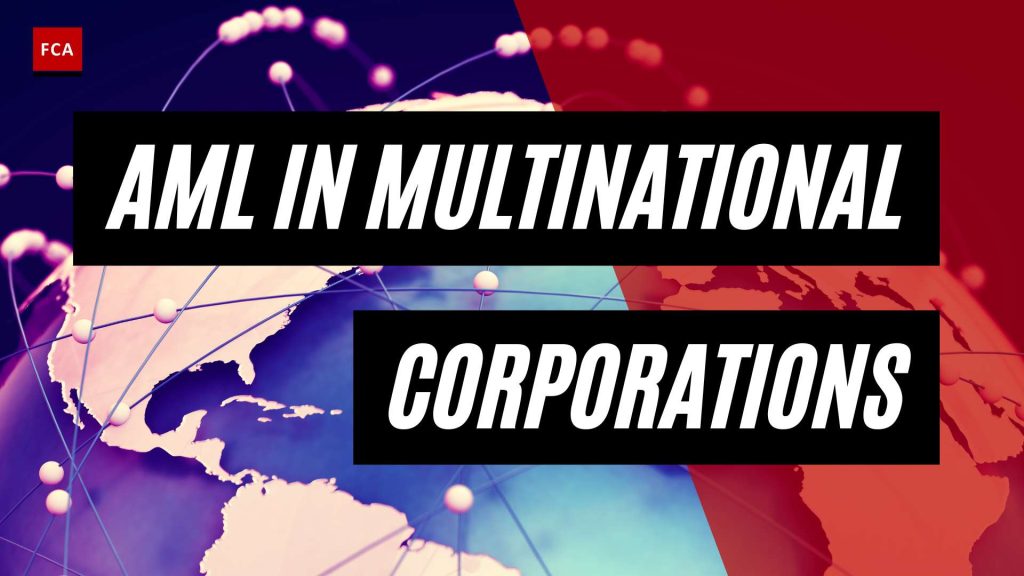The Importance of AML Compliance in Multinational Corporations
In the context of multinational corporations (MNCs), adherence to Anti-Money Laundering (AML) regulations is of paramount importance. AML regulations play a pivotal role in deterring criminal activities such as terrorism financing, money laundering, and other financial frauds that can destabilize economies (LexisNexis). By implementing effective AML compliance measures, MNCs contribute to the integrity and stability of global financial systems.
Role of AML in Global Financial Systems
Money laundering and terrorism financing pose significant threats to both global financial systems and national security. Governments and regulatory bodies must collaborate and exchange information internationally to combat these illegal behaviors effectively (Sanction Scanner). AML regulations play a crucial role in this collaboration by establishing global standards, promoting regulatory cooperation, and developing robust frameworks for enforcement and supervision.
The role of AML in global financial systems goes beyond individual jurisdictions. These regulations promote international trade and investment by fostering trust and integrity, mitigating risks for businesses and financial institutions, and boosting confidence among investors and stakeholders (LexisNexis). By adhering to AML compliance requirements, MNCs demonstrate their commitment to maintaining transparent and ethical business practices in the global marketplace.
Impact of AML Regulations on Multinational Corporations
Multinational corporations operate in diverse jurisdictions with varying AML regulations. Navigating these regulatory frameworks can be a challenging task for MNCs, requiring them to establish robust compliance programs to stay in line with the applicable AML requirements. Non-compliance can result in severe consequences, including monetary penalties, reputational damage, and legal ramifications. It is essential for MNCs to understand and adapt to the unique AML regulations in each country or region where they operate.
Moreover, multinational operations often involve cross-border transactions, which present additional challenges in terms of AML compliance. MNCs must implement effective systems for cross-border transaction monitoring to detect and prevent potential money laundering risks (Sanction Scanner). Integration of systems and data sources becomes crucial to ensure a holistic and comprehensive approach to AML compliance across all jurisdictions where the MNC operates.
Resource allocation and expertise are also significant challenges faced by multinational corporations in the realm of AML compliance. MNCs need to invest in qualified professionals, technology, and ongoing training programs to keep pace with evolving financial crimes and regulatory developments. This investment helps MNCs build a strong AML framework, enhance risk mitigation strategies, and ensure compliance with ever-changing AML regulations.
By prioritizing AML compliance, multinational corporations play a vital role in maintaining the integrity of global financial systems. Their commitment to implementing robust AML measures not only safeguards their own operations but also contributes to the collective effort in combating financial crimes and protecting economies worldwide.
AML Challenges Faced by Multinational Corporations
Multinational corporations encounter several challenges when it comes to Anti-Money Laundering (AML) compliance. These challenges arise due to the complex nature of their operations and the diverse regulatory frameworks they must navigate. Understanding these challenges is crucial for developing effective compliance strategies. The main AML challenges faced by multinational corporations include:
Complexity of Regulatory Frameworks
Multinational corporations operate in multiple jurisdictions, each with its own set of AML regulations and compliance requirements. These regulations can vary significantly in terms of scope, reporting obligations, and enforcement mechanisms. Managing compliance across diverse regulatory frameworks can be daunting and requires substantial resources and expertise. It is crucial for multinational corporations to stay up-to-date with the AML regulations in each jurisdiction they operate in and ensure alignment with the applicable requirements.
Cross-Border Transaction Monitoring
Global operations often involve cross-border transactions, which can complicate AML monitoring efforts. The movement of funds across different jurisdictions increases the risk of money laundering and necessitates robust monitoring mechanisms. Multinational corporations must establish comprehensive systems and processes to monitor cross-border transactions effectively. This includes implementing advanced transaction monitoring tools and techniques that can detect suspicious activities and patterns across various regions.
Integration of Systems and Data Sources
Multinational corporations typically operate with diverse systems and data sources, making it challenging to achieve a unified view of customer data necessary for effective AML compliance. Integration of these systems and data sources is crucial to ensure accurate and comprehensive monitoring of customer transactions. However, the integration process can be complex, requiring significant technological investments and coordination between different business units. Overcoming these integration challenges is essential to establish a comprehensive and efficient AML compliance framework.
Keeping Pace with Evolving Financial Crimes
As financial criminals adapt their methods to exploit vulnerabilities, multinational corporations must continually evolve their AML practices to keep up with emerging threats. Staying ahead of evolving financial crimes, such as money laundering and terrorist financing, requires ongoing monitoring of industry trends, regulatory updates, and best practices. Multinational corporations need to invest in training programs and cultivate a culture of vigilance and awareness to identify and respond to new and emerging risks effectively.
Resource Allocation and Expertise
AML compliance requires dedicated resources and specialized expertise. Multinational corporations often face challenges related to the allocation of adequate resources and the availability of skilled professionals to manage AML compliance effectively. Building a robust compliance program requires investments in technology, training, and human resources. Additionally, multinational corporations must ensure that their compliance teams possess the necessary knowledge and skills to navigate the complex landscape of AML regulations.
By understanding and addressing these AML challenges, multinational corporations can enhance their compliance efforts and mitigate the risk of financial crime. Implementing robust compliance programs, fostering collaboration with regulatory authorities and industry peers, leveraging technology and automation, and continuously investing in AML capabilities are key strategies for overcoming these challenges and ensuring effective AML compliance across global operations.
International Collaboration in AML Efforts
Efficient collaboration and cooperation between countries are crucial in combating money laundering and terrorist financing on a global scale. International collaboration in Anti-Money Laundering (AML) efforts involves various initiatives aimed at promoting global standards, sharing vital information and intelligence, pooling resources and knowledge, and utilizing innovative technologies for enhanced collaboration.
Promoting Global Standards and Cooperation
Establishing global standards and fostering regulatory cooperation are fundamental aspects of international collaboration in AML efforts. This involves aligning AML regulations across jurisdictions, enhancing transparency, and strengthening the legal frameworks to combat financial crimes (Sanction Scanner). By promoting global standards, countries can work together towards a common goal of preventing money laundering and terrorist financing.
Information Sharing and Intelligence Exchange
Information sharing and intelligence exchange form the backbone of effective international collaboration in AML efforts. Collaborative platforms facilitate the exchange of information, best practices, and intelligence among countries, enabling the identification of evolving tactics, patterns, and trends associated with illicit financial activities (Sanction Scanner). This exchange of information helps in targeted investigations and enables more efficient disruption of money laundering and terrorist financing networks.
Combining Resources and Knowledge
International collaboration allows countries to combine their resources and knowledge in the fight against financial crimes. By pooling resources, countries can enhance their capabilities to combat money laundering and terrorist financing. Capacity-building initiatives, training programs, and resource sharing contribute to strengthening the global AML framework and improving the effectiveness of efforts (Sanction Scanner). The collective expertise and resources can be harnessed to develop innovative approaches and strategies to counter financial crimes.
Innovative Technologies for Collaboration
Innovative technologies play a crucial role in facilitating international collaboration in AML efforts. Advancements in technology enable faster and more secure information exchange between countries. Tools and platforms that leverage technologies such as artificial intelligence, machine learning, and data analytics can aid in identifying suspicious activities, detecting patterns, and improving the overall effectiveness of AML efforts (Sanction Scanner). Embracing these technological advancements promotes more efficient collaboration and strengthens the fight against money laundering and terrorist financing.
As multinational corporations (MNCs) are involved in a significant portion of global economic activities, their cooperation and compliance with international AML initiatives are crucial. By actively participating in international collaboration efforts and aligning their internal AML practices with global standards, MNCs can contribute to the overall effectiveness of AML efforts and help create a more secure global financial system.
In the next section, we will explore the specific AML challenges faced by multinational corporations, highlighting the complexity of operations, lack of coordinated approach to compliance, and the fragmentation of data and reporting mechanisms.
AML Challenges in the Digital Age
As globalization and digitalization continue to shape the business landscape, multinational corporations face unique challenges in AML compliance in the digital age. Emerging technologies, the need to balance compliance with business needs, staying up-to-date with regulations, and the consequences of non-compliance are key areas that require attention.
Emerging Technologies and Money Laundering
The rapid advancement of technology has provided new avenues for money laundering and financial crimes. Criminals constantly evolve and find new ways to launder money, including using shell companies, offshore accounts, and digital currencies, as well as employing complex transactions like layering and integration. These practices make it difficult for financial institutions to trace the origin of funds (Sanction Scanner). Multinational corporations must stay vigilant and employ advanced technologies and detection mechanisms to identify and prevent these illicit activities.
Balancing Compliance with Business Needs
Multinational corporations operate in diverse jurisdictions with varying legal and regulatory requirements. Balancing AML compliance with business needs can be a delicate task. Striking the right balance is crucial to ensure that compliance measures do not hinder legitimate business operations. It requires careful assessment, risk analysis, and implementation of effective AML strategies that align with the organization’s goals while safeguarding against financial crime.
Staying Up-to-Date with Regulations
Regulatory landscapes are constantly evolving to address emerging risks and combat financial crimes. Multinational corporations must keep pace with these changes to ensure compliance. The use of virtual assets, digital identity, blockchain, and other emerging technologies adds complexity to AML compliance, as regulations may vary across different jurisdictions. Staying up-to-date with regulations is essential to avoid penalties and reputational damage.
Consequences of Non-Compliance
The consequences of non-compliance with AML regulations can be severe for multinational corporations. Regulatory authorities impose substantial fines and penalties for violations, which can have a significant impact on the organization’s financial health and reputation. Additionally, non-compliance may result in legal repercussions, damage to customer trust, and exclusion from certain markets. To mitigate these risks, multinational corporations must prioritize robust AML compliance programs and remain vigilant in their efforts to combat money laundering.
Navigating the challenges presented by the digital age requires proactive measures and a comprehensive approach to AML compliance. Multinational corporations must invest in advanced technologies, adapt their compliance programs to the evolving landscape, and foster collaboration with regulatory authorities and peers. By staying informed, leveraging innovative solutions, and continuously investing in AML capabilities, multinational corporations can effectively address the challenges posed by the digital age and ensure compliance with global AML requirements.
AML Challenges Specific to Multinational Corporations
Multinational corporations face unique challenges when it comes to implementing effective Anti-Money Laundering (AML) compliance programs. These challenges arise due to the complexity of their operations and legal frameworks, the lack of a coordinated approach to compliance, the need to monitor transactions across borders, and the fragmentation of data and reporting mechanisms.
Complexity of Operations and Legal Frameworks
Multinational corporations operate in multiple jurisdictions, each with its own AML regulations and legal requirements. The complexity of navigating these diverse legal frameworks poses a significant challenge. Compliance teams must stay up-to-date with the AML regulations in each jurisdiction and ensure that their programs align with the specific requirements of each country. This complexity increases the risk of non-compliance and the potential for penalties and reputational damage.
Lack of Coordinated Approach to Compliance
Due to the decentralized nature of multinational corporations, there is often a lack of a coordinated approach to AML compliance. Different business units or subsidiaries may have their own compliance processes and systems, leading to inconsistencies and gaps in compliance efforts. It is crucial for multinational corporations to establish a centralized governance structure that ensures consistent implementation of AML policies and procedures across all jurisdictions.
Monitoring Transactions Across Borders
Multinational corporations engage in cross-border transactions, making it challenging to monitor and detect suspicious activities effectively. Money laundering schemes often involve complex networks spanning multiple countries, making it difficult to track illicit funds. Multinational corporations must implement robust transaction monitoring systems that can effectively analyze cross-border transactions and identify potential red flags.
Fragmentation of Data and Reporting Mechanisms
One of the significant challenges faced by multinational corporations is the fragmentation of data and reporting mechanisms. Data related to customers, transactions, and third parties are often stored in different systems and formats across various regions. This fragmentation makes it challenging to establish a comprehensive view of data necessary for effective AML compliance. It also hinders the ability to generate accurate and timely reports for regulatory authorities.
To overcome these specific challenges, multinational corporations must take proactive measures to enhance their AML compliance efforts. This includes establishing a robust compliance program that spans across all jurisdictions, promoting collaboration and information sharing between different units and jurisdictions, leveraging technology and automation to streamline processes and improve data analysis capabilities, and continuously investing in AML capabilities to stay ahead of evolving regulatory requirements and financial crimes.
By addressing the complexity of operations and legal frameworks, establishing a coordinated approach to compliance, implementing effective cross-border transaction monitoring, and streamlining data and reporting mechanisms, multinational corporations can navigate the AML landscape more effectively and ensure compliance with global AML regulations.
Overcoming AML Challenges in Multinational Corporations
To address the unique AML challenges faced by multinational corporations, it is essential to implement effective strategies and measures. Overcoming these challenges requires a comprehensive and proactive approach. Here are some key strategies that can help multinational corporations navigate the complexities of AML compliance:
Establishing a Robust Compliance Program
To effectively combat money laundering and financial crimes, multinational corporations need to establish a robust AML compliance program. This program should include clear policies, procedures, and guidelines tailored to the specific needs of the organization. It should also incorporate risk assessments, due diligence processes, and ongoing monitoring to identify and mitigate potential risks.
A strong compliance program should be supported by a dedicated AML team responsible for implementing and overseeing the program. This team should consist of experienced professionals with a deep understanding of AML regulations, industry best practices, and emerging trends.
Collaboration with Authorities and Peers
Collaboration with local authorities, regulators, and industry peers is crucial in overcoming AML challenges in multinational corporations. By sharing information and best practices, organizations can enhance their AML efforts and stay ahead of evolving money laundering techniques. Collaborative initiatives can include information sharing, joint investigations, and participation in industry forums and working groups.
Building strong relationships with authorities and peers also helps multinational corporations stay informed about regulatory changes and expectations. This enables them to adapt their compliance programs and processes accordingly, ensuring alignment with evolving global standards.
Leveraging Technology and Automation
The use of advanced technologies can significantly enhance AML capabilities in multinational corporations. Artificial intelligence (AI), machine learning, and data analytics can automate routine tasks, improve risk detection capabilities, and enhance the accuracy and efficiency of AML investigations.
By leveraging technology, organizations can analyze vast amounts of data more effectively, identify patterns and anomalies, and detect potential money laundering activities. Implementing technological solutions can also facilitate transaction monitoring, customer due diligence, and suspicious activity reporting. It is important to regularly update and upgrade technology systems to keep pace with emerging threats and regulatory requirements.
Continuous Investment in AML Capabilities
As money laundering techniques and regulatory expectations continue to evolve, multinational corporations must make ongoing investments in their AML capabilities. This includes providing regular training and education to employees about AML risks, obligations, and best practices.
Organizations should also allocate sufficient resources to maintain a robust compliance program, including personnel, technology, and expertise. Regular assessments and audits can identify areas for improvement and ensure the effectiveness of AML controls and processes.
By adopting these strategies, multinational corporations can strengthen their AML compliance efforts and effectively mitigate the risks associated with money laundering and financial crimes. It is essential to continually monitor and adapt to changing regulatory landscapes and emerging threats to maintain a proactive and effective AML compliance program.
Ensuring AML Compliance in Multinational Corporations
To address the complex challenges of Anti-Money Laundering (AML) in multinational corporations, it is crucial to establish robust processes and strategies that ensure compliance with evolving regulations. Here are key measures that can help organizations navigate the AML landscape effectively.
Risk-Based Approach and Centralized Governance
A risk-based approach is fundamental to effective AML compliance in multinational corporations. By conducting regular risk assessments, organizations can identify and prioritize areas that pose higher risks of money laundering or terrorist financing. This approach allows for the allocation of resources and efforts where they are most needed, ensuring a targeted and efficient compliance program.
Centralized governance plays a crucial role in overseeing and coordinating AML efforts across different regions and business units. It enables consistent implementation of policies, procedures, and controls, ensuring alignment with global standards and local regulations. Centralized governance also facilitates effective communication and coordination between various stakeholders, enhancing the organization’s ability to address AML challenges holistically.
Regular Risk Assessments and Training Programs
Regular risk assessments are essential to identify emerging risks and adapt AML measures accordingly. These assessments should consider factors such as the organization’s geographic footprint, business activities, and customer base. By staying abreast of changing risks, multinational corporations can proactively enhance their AML controls and mitigate potential vulnerabilities.
Training programs are crucial to ensure that employees understand their roles and responsibilities in AML compliance. Regular and tailored training sessions help raise awareness about money laundering risks, suspicious transaction indicators, and reporting obligations. Training programs should be designed to address the unique challenges faced by multinational corporations, taking into account the diverse legal frameworks and cross-border transaction complexities.
Effective Monitoring of Transactions
Multinational corporations need robust systems and processes for monitoring transactions across borders. This involves implementing sophisticated technologies that can detect and flag suspicious activities in real-time. Automated transaction monitoring systems, powered by advanced analytics and machine learning, can enhance the organization’s ability to identify patterns, anomalies, and potential risks.
It is crucial to establish strong internal controls and procedures that facilitate timely and accurate reporting of suspicious transactions. This includes ensuring proper documentation and record-keeping, as well as conducting thorough investigations when red flags are raised. By promptly addressing suspicious activities, multinational corporations demonstrate their commitment to AML compliance and contribute to the integrity of global financial systems.
Compliance with Evolving Regulations
Multinational corporations must stay up-to-date with the evolving AML regulations across the jurisdictions in which they operate. Compliance teams should closely monitor regulatory developments, assess their impact on existing compliance programs, and make necessary adjustments. This includes implementing changes to policies, procedures, and controls to meet new requirements and expectations.
Engaging with industry associations, regulatory bodies, and professional networks can provide valuable insights into emerging trends and best practices in AML compliance. By actively participating in these forums, multinational corporations can contribute to the development of global standards and collaborate with peers to address common challenges.
Ensuring AML compliance in multinational corporations requires a comprehensive and proactive approach. By adopting a risk-based approach, conducting regular risk assessments, implementing effective monitoring systems, and staying abreast of evolving regulations, organizations can enhance their AML capabilities and contribute to the global fight against financial crimes.









